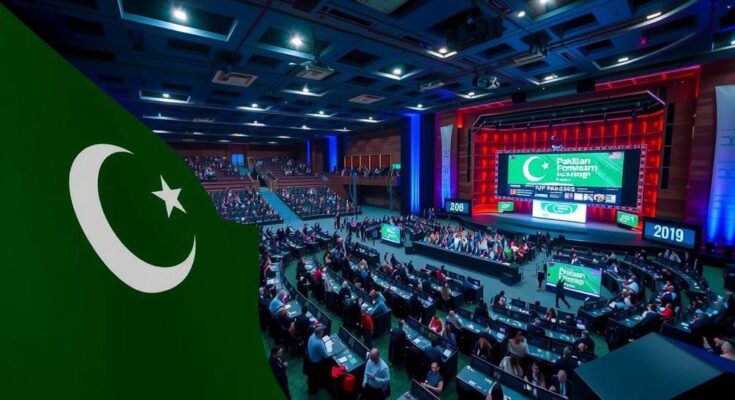Pakistan has garnered attention at COP29 with its well-located pavilion that hosts talks on climate challenges, drawing significant interest and participation from delegates. While the pavilion cost $250,000, it serves as a crucial platform for advocating climate justice. Pakistan’s financial constraints limit its delegation presence, yet the commitment to global climate discourse remains strong.
Pakistan has made a significant impact at the COP29 conference by establishing a well-located pavilion, which has proven to be popular among delegates. The pavilion featured an array of talks with both international and local experts that addressed Pakistan’s urgent climate challenges. Despite its hefty cost of $250,000, the government deemed it necessary to showcase the nation’s climate plight on a global stage. The pavilion has become a gathering place with an engaging atmosphere, drawing attention and interest, particularly through unique cultural displays and the distribution of popular local pins, which fostered enthusiastic interactions among attendees.
The pavilion’s strategic positioning in a high-traffic area has facilitated a robust presence throughout the first leg of COP29, attracting dignitaries and experts from various fields who contributed to lively discussions. Notable figures, including Supreme Court judges and representatives from prominent organizations, participated in sessions that overflowed with attendees. Many commented on the pavilion’s effectiveness in raising Pakistan’s profile among other nations. Provisions of food and tea at midday sessions further enhanced visitor engagement, providing an incentive to stop by amidst a crowded venue.
However, Pakistan’s participation has not come without challenges, particularly regarding the lack of funds for a dedicated delegation office. This limitation hindered more private discussions, which could take place elsewhere in the venue. In contrast, India chose a low-key approach with a mere delegation office. Despite budget restrictions, Pakistan’s dedication to advocating for climate justice remained evident, with officials emphasizing the necessity for immediate international action on climate issues.
The preparatory efforts leading to COP29 included a simulation drive aimed at ensuring Pakistan’s representatives were adequately prepared for their crucial advocacy work at the conference. Although some journalists humorously lamented the extensive physical demands of navigating the venue, they noted that the intense activity could lead to improved health outcomes by the summit’s conclusion. The presence of approximately 3,000 volunteers further supported conference operations, easing the navigation for all attendees.
The Conference of Parties (COP) is an annual event where nations gather to discuss climate change policies and initiatives. COP29 is particularly significant as it highlights global responses to urgent climate challenges and lays the groundwork for future action. Countries utilize pavilions at the conference to raise their international profile and engage with other leaders and stakeholders on relevant climate issues. Pakistan’s pavilion at COP29 has provided a platform for expressing the nation’s climate concerns amidst ongoing economic difficulties, showcasing cultural elements and fostering discussions with global experts.
In conclusion, Pakistan’s proactive participation at COP29 through its strategically positioned and engaging pavilion underscored its commitment to addressing climate justice. Despite financial constraints limiting the establishment of a delegation office, the pavilion has served as a vital space for raising awareness and soliciting support for climate issues facing Pakistan. The collaborative spirit observed among attendees highlights the importance of multi-stakeholder engagement in tackling the pressing challenges of climate change.
Original Source: www.dawn.com




